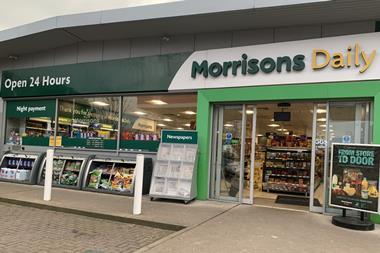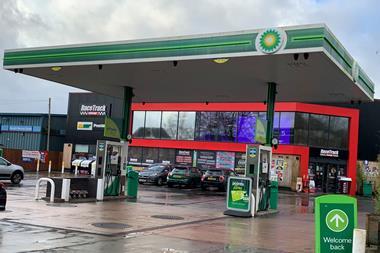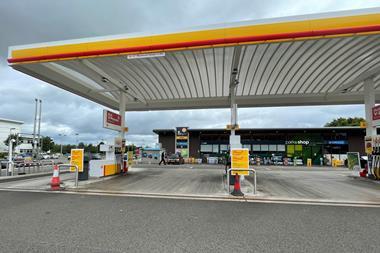While Palmer and Harvey’s difficulties were common knowledge they’d put out a notice about takeover talks to secure the company’s future the instant termination of all deliveries when it went into administration meant forecourt owners had to scramble to keep their shops supplied.
MRH, the UK’s biggest independent forecourt operation with more than 450 sites which agreed a new £90m, five-year supply deal with P&H in 2016 was prepared when the call came through. MRH chief executive Karen Dickens said: "MRH has worked closely with P&H over the years and the service provided by their team has always been very good. We have had contingency plans in place for some time and these have been activated to ensure continuity of supply to our P&H-supplied sites. We are confident that all these sites will continue to be well stocked, and there should be no disruption for our customers."
Smaller retailers also showed the flexibility needed to maintain stocks. Sarah Nicholson at Stalham Engineering in Stalham, Norfolk, has a Mace shop. She received no deliveries in the week that operations ceased, but managed to keep supplied by going to a cash and carry depot, 20 miles away in Norwich. She said: "The collapse of P&H wasn’t entirely a shock as their service had not been great for a while. We’re carrying on as usual at the moment customers wouldn’t notice any changes.
"We’re just waiting for Costcutter to come back to us with an alternative supply deal."
Jonathan Gates, of Gates of Brockenhurst in Hampshire, also said the collapse of P&H was not entirely a surprise as he’d heard all the rumours in the trade. He added: "I understand Costcutter is still working on a supply deal but we’re a one-off site so in the meantime we can cope. It means extra hassle and extra time but it’s more of an inconvenience than a disaster."
Top 50 Indie Majid and Sons has 10 forecourts, one of which Brookside Service Station in Berkshire is Mace branded. A member of staff at the site said he didn’t think there would be any problems with supplies as they would use their other stores’ suppliers.
Shortly after P&H went into administration, it was revealed that Costcutter had notified the delivered wholesaler of a decision to end the £500m contract for supplying its members. On November 29, the Co-op and Costcutter Supermarkets Group (CSG) confirmed an agreement that will see Co-op become the exclusive wholesale supplier to CSG and the 2,200 Costcutter, Mace, Simply Fresh, Supershop and kwiksave convenience stores across its network from spring 2018. The deal will also provide the opportunity for CSG’s independent retailers to become Co-op franchisees.
The Co-op also confirmed that it was looking at short-term ways it could support independent retailers within CSG, as part of a wider industry response, until the formal agreement begins.
Commenting, Darcy Willson-Rymer, CEO of Costcutter Supermarkets Group, said: "With P&H no longer able to supply our stores, we have activated our contingency plans that will see our retailers supported by the Co-op and other suppliers in the run-up to our deal with the Co-op." Jo Whitfield, chief executive of Co-op Food, added: "We are operating in a dynamic market environment and this deal, coming shortly after our Nisa announcement, shows how we are positively responding to the changes occurring within the sector. Our food business is going from strength to strength in what is clearly a challenging market.
"While our deal with Costcutter will start formally in spring 2018 we are looking at practical ways we can support independent retailers during this busy trading period, in light of the news concerning P&H. It is essential that we maintain a strong independent retail sector and the Co-op is committed to playing its part."
McColl’s Retail Group was another major retailer that had given notice on a supply deal with P&H, having agreed a wholesale deal with Morrisons including the resurrection of the Safeway brand, but it was not due to kick in until January 2018. However, Nisa confirmed it had agreed a new short-term supply contract to cover around 700 of McColl’s newsagents and smaller convenience stores, previously supplied by P&H. In a statement it said: "Nisa has moved to mobilise its support, while ensuring its existing availability levels will be maintained for all members throughout the important festive trading period. All of the McColl’s stores previously supplied by Palmer and Harvey will receive ambient stock delivered through existing Nisa-supplied McColl’s stores, for onward transfer by McColl’s teams."
Arnu Misra, interim CEO of Nisa, added: "I’m very pleased that Nisa has been selected by McColl’s to further support them at this crucial time. We have a highly flexible distribution model that enables us to scale quickly to members needs and as demand dictates. As a result, we will continue to manage both existing and new members without impacting our traditionally high levels of service, especially over the peak trading period."
As P&H was a major distributor of tobacco products in the UK it delivered approximately 25% of Japan Tobacco’s volume the major manufacturers had worked very closely with it in an attempt to find a solution to its problems. They revealed its collapse would be costly for them, with Imperial Brands saying it would take a hit of up to £160m, the majority of which would relate to excise duty, and Japan Tobacco said its maximum exposure was £148m. However, both companies said they had well-prepared contingency plans which would ensure that there were no significant interruptions in the supply of their products.
With the remaining suppliers all rushing to fill the gap left by P&H, it looks as if the forecourt and wider convenience sector should be able to cope well, even with such a large and sudden upheaval just before its busiest trading period.
Details of the collapse
Eight companies in the Palmer & Harvey group including P&H Direct Van Sales, P&H Sweetdirect, and P&H Snacksdirect went into administration and ceased operations on November 28. However, WS Retail Limited, which is also part of the P&H group and trades as Central Convenience Stores, was not placed into administration. Its 120-plus estate of stores in the south of England, including at least 16 forecourts, continues to trade as normal. There were reports that Bestway had won the contract to supply it.
P&H once claimed it was the biggest supplier to the forecourt sector and its administrators, PricewaterhouseCoopers (PwC), described it as "the UK’s largest delivered wholesaler to the UK convenience market, with around 90,000 customers ranging from small local corner stores to the UK’s largest supermarkets".
PwC said the group has been by hit by challenging trading conditions in recent months and efforts to restructure the business had been unsuccessful. This resulted in cash-flow pressures and it has not been possible to secure additional funding to support the business.
P&H Group employed about 3,400 staff and there were 2,500 immediate redundancies at head office and in the branch network. The remaining employees will assist the administrators in managing the closure.





























No comments yet